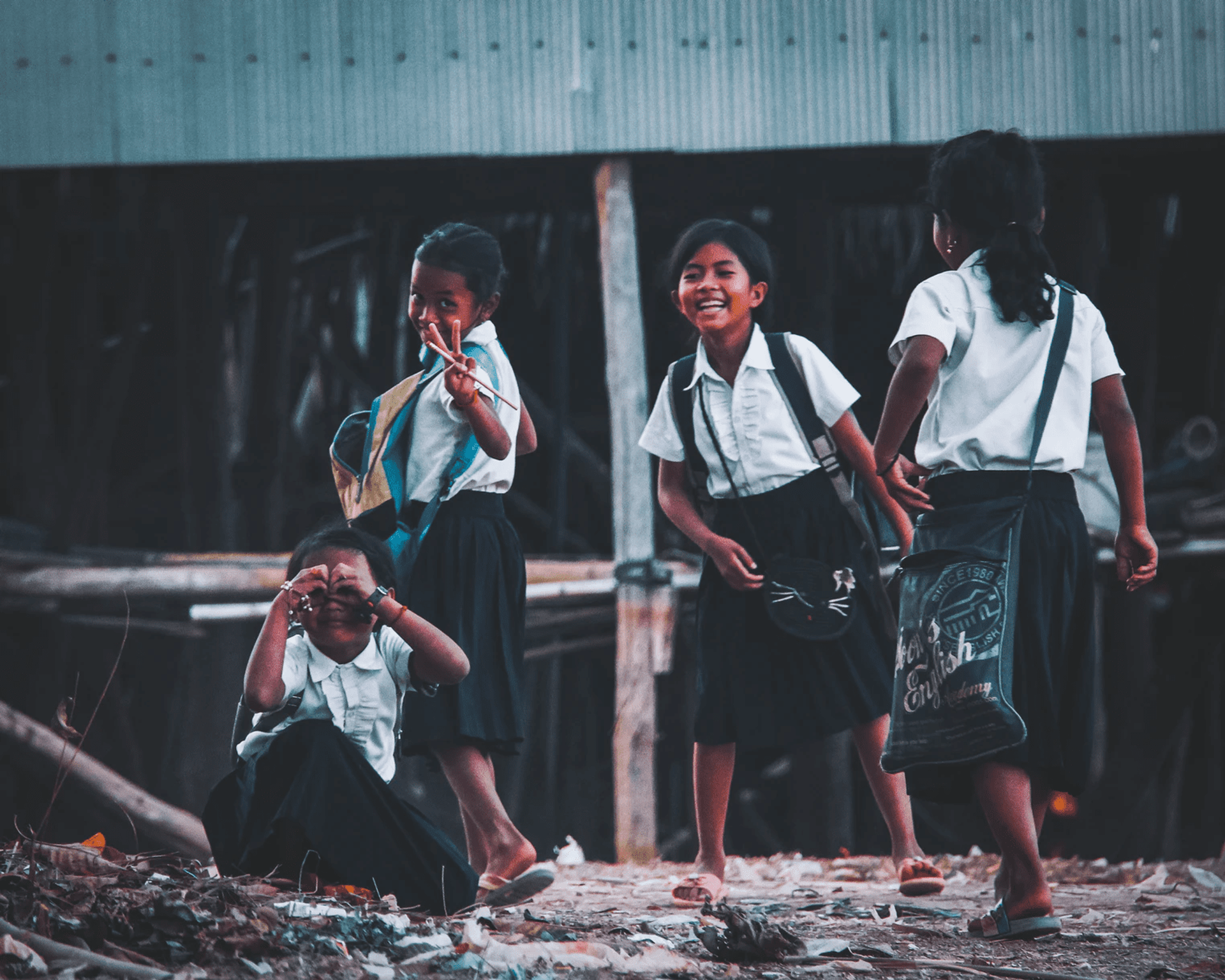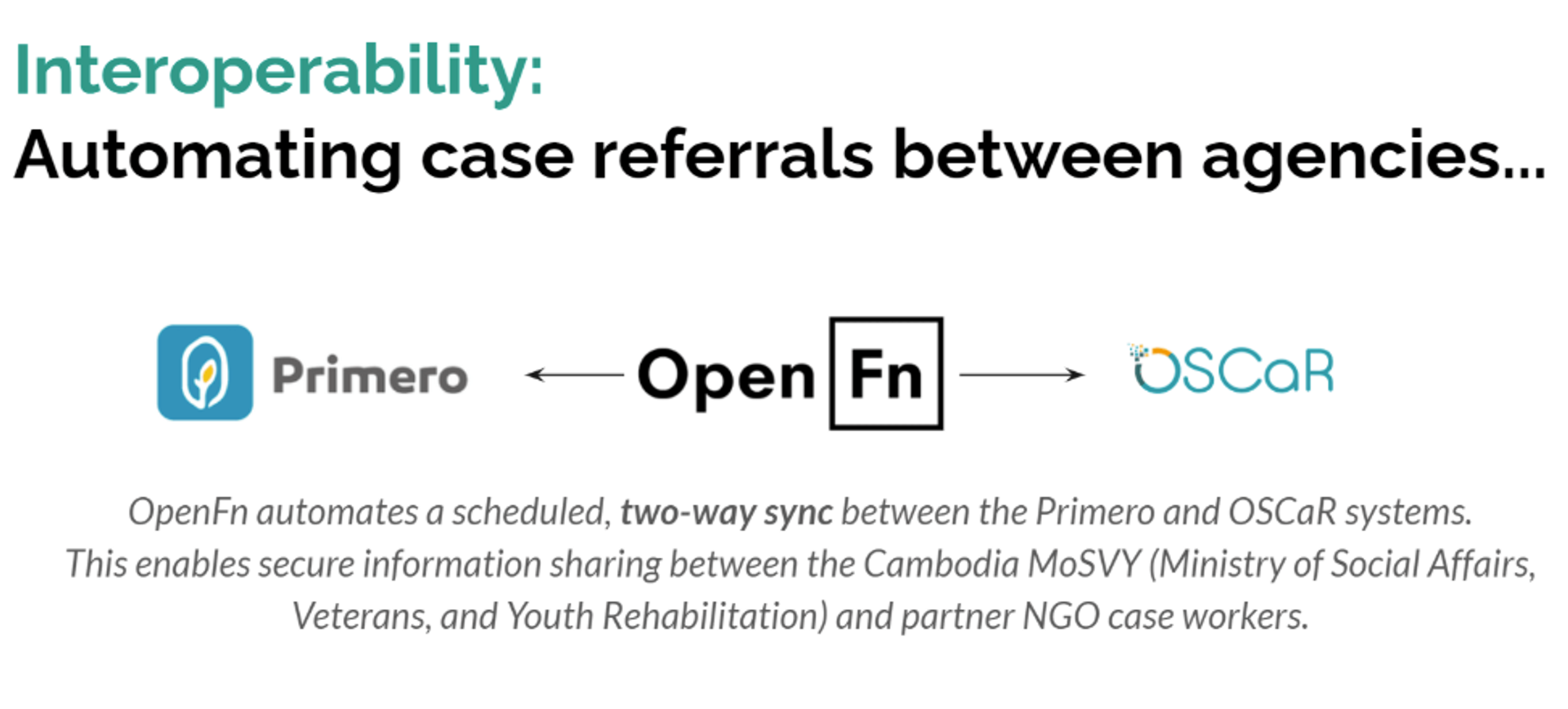Enabling Interoperability for Child Case Referrals in Cambodia
Over the past 12 months, OpenFn and UNICEF Cambodia have worked together to enhance interoperability for the critical software tools Cambodian agencies rely on to protect and respond to the needs of vulnerable children and women. Key outcomes achieved so far via this partnership include the implementation of a secure OpenFn project space with the automated data sharing workflows required to allow for the Cambodian government and their partner NGO caseworkers to communicate with one another seamlessly.

Case management applications help social service providers coordinate critical support activities for vulnerable children; ensuring that they can securely connect with one another and automating the flow of data between themshare and the launch of these integration features is especially important amidst an increase in the rates of domestic and gender based violence linked to the COVID-19 pandemic. Additionally, the secure workflows the automation allows—critically, facilitating the complex referral process—brings the child protection system in Cambodia one step closer to the collective dream of providing holistic, compassionate care.
The Key Partners
The Child Protection team at UNICEF Cambodia, working in concert with the country’s Child Welfare Department of the Ministry of Social Affairs, Veterans and Youth Rehabilitation (MoSVY) defined the scope of the interoperability requirements and guided this program’s implementation. Because achieving interoperability can be complex, OpenFn was brought into the consortium to offer expert integration insights and to provide the digital infrastructure required to enable the program’s goals.
The Systems Integrated
The systems OpenFn integrated for the first phase of this project are Primero and OSCaR. Primero is an open source software platform that helps social services, humanitarian and development workers manage protection-related data, with modules that facilitate case management, incident monitoring and family tracing and reunification. OSCaR (Open Source Case-management and Record-keeping) is a case management software system that is used by civil society organizations in Cambodia to manage cases or children in residential care.

First a definition: “Interoperability”, in this context, is the automated ability of computer systems to work in concert with (sharing data and collaborating on processes with) other systems. Defining interoperability is the easy part; achieving it is another story. “In a complex, interagency project like this, it’s true that the technologies in play often don’t ‘speak the same language’, but neither do the partners,” writes Aleksa Krolls, OpenFn’s Head of Services. “Our job is not only to facilitate the flow of data between systems, but to facilitate the process by which our partners—human users—communicate meaning across multiple agencies and people.”
In this example, OpenFn’s software is acting as the “translator” between the OSCaR and Primero systems. OpenFn’s primary interoperability objective for this first phase was to facilitate Cambodian government partners and local non-governmental organizations in systematic registration and tracking of children in Cambodia, including facilitating duplicate detection between systems and enabling easy-to-use processes for updating beneficiary/client details.
The work is just beginning
OpenFn’s work with UNICEF Cambodia and the MoSVY doesn’t end here though. We are now beginning the process of enabling further Primero interoperability with software like ProGres v2, UNHCR’s institutional tool, as well as enabling Primero-to-Primero implementations in the field. We’ll be sure to keep the community updated as the project progresses.
Many of the best responses to the critical issues we face as a society emerge from collaboration and interoperability enables collaboration in the digital domain. Just as no single actor or organization can deliver all the services required to protect vulnerable children and survivors of violence, no single technology can be successful operating in isolation.
Case management automation allows for a social worker to spend more time being there for the vulnerable populations they serve and less time copying and pasting data between the applications they use. This partnership between OpenFn, UNICEF Cambodia and the MoSVY means that fewer children will need to painfully re-tell their traumas just to receive the help they need.
If your organization is in the health and humanitarian sector and is thinking about automation and interoperability, contact services@openfn.org for a free consultation.
About UNICEF Cambodia: UNICEF Cambodia’s mission is to promote the healthy development of children, to defend their rights and help them fulfil their potential, from early childhood to adolescence.
About Cambodia’s Ministry of Social Affairs, Veterans and Youth Rehabilitation (MoSVY): Cambodia’s MoSVY is a government agency with a broad mandate that includes supporting the efforts of social workers across the country.
About OpenFn Group: Open Function Group (“OFG”) helps health and humanitarian interventions in 40+ countries achieve scale and improve service delivery through automation, data integration, and interoperability solutions.
Written by
Jed Goldstein